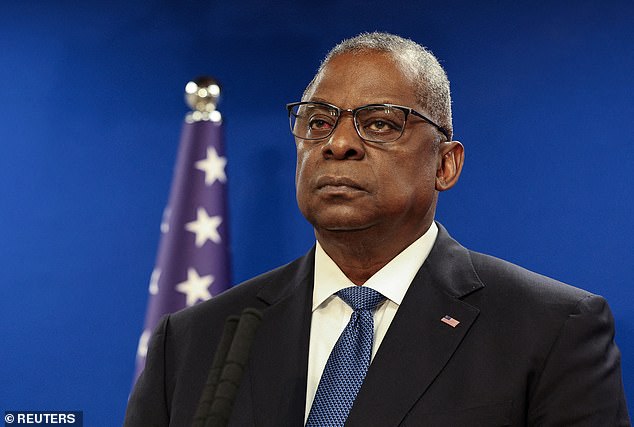Biden didn’t question Defense Secretary and Lloyd Austin didn’t disclose prostate cancer diagnosis in initial phone call after president found out about secret ICU stay as US was preparing to bomb Yemen
President Joe Biden did not learn Defense Secretary Lloyd Austin’s diagnosis on the first phone call after finding out he had been secretly in intensive care for days and wished him only the best.
Biden was kept in the dark about Austin’s health crisis, but even as public outrage over the secrecy grew, he reportedly did not chastise him or ask for details.
Instead, the pair had a brief “warm” phone call during which Austin provided no information, according to the Washington Post.
It is unclear whether Biden did not ask about his diagnosis or whether Austin did not reveal it during the call.
Austin faced a barrage of criticism from both Republicans and Democrats for not disclosing that he was in the hospital as the country dealt with national security situations in Ukraine and the Middle East.
His second-in-command, Kathleen Hicks, was on vacation in the Caribbean at the time and did not discover that Austin was seriously ill until January 4, two days after he was placed in intensive care.
President Joe Biden first spoke to Austin on January 6, but reportedly did not ask for details about his condition

Secretary of Defense Lloyd Austin was hospitalized to be treated for prostate cancer but didn’t tell anyone for several days, even when he was placed under general anesthesia
She reportedly planned to cut her vacation in Puerto Rico short, but decided to stay away after hearing that Austin planned to return to work the next day.
Pentagon officials did not learn of Austin’s illness and hospitalization until January 2, but no one informed the White House or Hicks of his whereabouts for another two days, despite Hicks being de facto in charge at the time.
After finally finding out on the evening of January 4 that Austin was unwell and in intensive care, Biden did not speak to him for another two days.
On January 6, he called the secretary of defense, but instead of being angry about his secrecy and the subsequent public outcry, Biden reportedly simply asked him how he was doing and wished him well.
Officials told the Post that the call was short and “warm.”
Austin had learned he had prostate cancer in early December, when the disease was still in its early stages and considered highly treatable.
He kept his original surgery a secret from Biden and his administration on December 22, despite being placed under general anesthesia and unconscious.
Hicks was given the powers by Austin at the time, but was not told why.

Officials only discovered he was unwell when he was placed in ICU on January 2
But Pentagon officials also did not tell the White House for days that Austin had returned to the hospital by ambulance on Jan. 1 after experiencing severe pain.
As public outrage grew over the apparent breach of national security, and with ongoing crises in the Middle East and Ukraine, Biden remained in the dark about the nature of Austin’s illness.
He only learned of his diagnosis on January 9 – the same day the Pentagon announced the details to the public – a month after Austin first learned he was unwell, and more than two weeks after his first surgery.
In a statement that day, White House spokesman John Kirby said, “No one in the White House knew until this morning that Secretary Austin had prostate cancer, and the President was notified immediately after we knew.”
The same day, the Pentagon said it was correcting its procedures.
“The department is taking immediate steps to correct our notification procedures,” Pentagon press secretary Maj. Gen. Patrick Ryder said during his briefing.
“Nothing is more important to the Secretary of Defense and the Department of Defense than the trust of the American people and the public we serve, and we will continue to work every day and work hard every day to earn and earn that trust,” he said. said.
He added that the Pentagon was investigating the matter internally.
‘We want to ensure that reports are made in a timely manner. And in this way, as we’ve recognized, there were some shortcomings and so it’s important that we go back and look at what those shortcomings bring about. What could have been better and make sure this happens in the future. We are improving those processes,” Ryder said.
The secrecy came days before the US launched a bombardment of Houthi targets in Yemen. On January 11, the US led a group of countries in attacks in response to Houthi attacks on commercial ships in the Red Sea.
On Friday, Biden expressed his first displeasure with Austin, saying he had shown an error in judgment by choosing not to disclose his hospitalization.
During a visit to small businesses in Allentown, Pennsylvania, Biden was asked if he has confidence in Austin, to which he replied, “I do.”
Asked if it was an error of judgment if Austin didn’t inform him of his hospitalization, Biden said, “Yes.”
Every year, eight in ten men and six in ten black men are diagnosed with prostate cancer. The risk for men increases as they get older. According to the Centers for Disease Control and Prevention, it is the most common cancer among men in the United States.
The five-year relative survival rate for prostate cancer in the United States is 97 percent.
